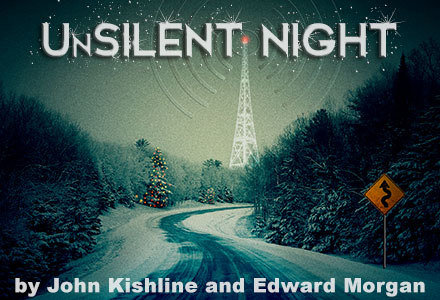
As holiday-themed productions continue to roll into town, a single light is burning brightly at Next Act Theater, which is presenting the world premiere of a new holiday play by local playwrights John Kishline and Edward Morgan. Called UnSilent Night, the show, set in 1953 Milwaukee, takes place entirely in a radio station, where the crew is finishing up its broadcast on Christmas Eve.
The station is run by three people: Frank, a quick-witted DJ (David Cecsarini, who’s also Next Act’s producing artistic director); Roger, the station’s owner (played convincingly by an uptight Doug Jarecki); and Liz, the show’s producer who tries to keep peace between the endlessly feuding men (Molly Rhode). The play is directed by Edward Morgan. It’s a treat to see Molly Rhode onstage, which doesn’t happen often since she shifted to directing a number of years ago. Her nuanced performance as the frustrated producer and young widow for whom Christmas brings many painful memories is a highlight of this polished production.
Milwaukee’s John Kishline has numerous playwriting credits, and his gift for dialogue and pacing is seen here. In the first act, we see a very unhappy Frank, who is irritated by the numerous phone calls from his wife reminding him to pick up a few items from the grocery store on his way home. Roger is unhappy, too; he threatens to fire Frank for his ad-libbed remarks, including a graphic description of how sausage is made. This did not amuse Usinger’s Sausage which, Roger reminds Frank, is one of the station’s largest sponsors. And Liz has decided to call it quits after dealing with another row between the guys. She realizes she has to spend more time grieving for her husband, lost in the Korean War, and in learning how to live without him.
Although this scenario doesn’t sound particularly funny, there are plenty of lighter moments throughout. Frank’s on-air ego, a high-pitched dimwit who typically goes off the rails until “corrected” by the more moderate Frank, provides some of the fun. Roger’s fuming, fueled by Frank’s persistent ad libs, also lighten the mood.
Local audiences will chuckle over the mention of well-known (and some long-gone) stores such as Schuster’s Department Store and Gilles Custard, plus mention of then-popular sports teams such as the Milwaukee Braves (baseball). Frank, the cynic, wonders why Christmas should be celebrated at all, when citizens are encouraged to build bomb shelters in their backyards, and children receive instruction on “duck and cover” in their classrooms? At the end of the first act, a mysterious, dark-skinned stranger wanders into the station’s unlocked front door. He’s just returned to Milwaukee from a stint in the Korean War. After losing two of his best neighborhood buddies in battle, he returns to town with a severe case of PTSD (called “shellshock” in those days) and a feeling that nothing has changed. He wants to be lauded for his service and rewarded with a decent job, but his sometimes-irrational behavior means he can’t keep a job for long.
Milwaukee native Andrew Muwonge shifts the entire play’s direction. A black soldier who shows up in his dress uniform, he hesitantly tells audiences listening on Frank’s show about what he has seen and heard on the battlefield. He talks about racism and discrimination in the ranks, and releases his long-buried fury on civilians who ignorantly claimed that black soldiers were cowards who wouldn’t hold their ground in combat. Frank’s fascination with a more “interactive” form of radio (an early version of talk radio) eventually involves this young visitor. Doug Jarecki does a fine job of playing all of the call-in listeners. Some share their own war stories, while others express their viewpoints about the war. Their remarks add a great deal of information about what Milwaukeeans were thinking and feeling during the 1950s.
By the time the play wraps up, Frank has found something positive to focus on during these uncertain times. He makes several kindly offers to the soldier. Liz hears for the first time (from a listener, one of the men in her late husband’s company) details about what actually happened when her husband died. It gives her a small measure of peace. And the station manager gets a surprising phone call that means Frank still has a job at the station – for now.
